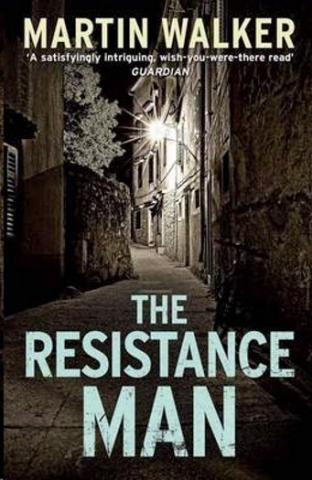‘Resistance Man’ Is Latest Addition to Martin Walker’s ‘Bruno’ Series

The Resistance Man
By Martin Walker
Knopf
313 pages
In the opening pages of the latest addition to Martin Walker’s “Bruno, Chief of Police” series, the reader encounters a swarm of characters: Napoleon and Josephine, Blanco, Balzac and Father Sentout, only the last of whom is homo sapiens (the others are geese, fowl and Basset hound puppy, respectively). It’s a portent of the many, but not exclusively human characters still to come.
Bruno, as he’s known, is Chief of Police Benoit Courreges, a resident of the village of St. Denis in southwestern France. The Resistance Man is the sixth in a series featuring this likeable policeman who, when he’s not pursuing investigations into local crimes, whips up lovingly described meals for his lady friends and other citizens of St. Denis:
“First, he heated a pan of sunflower oil for beignets. Then he readied a bowl of spicy salsa, removed from the fridge a pot of Stephane’s aillou (fresh cheese flavored with herbs and garlic), spooned it into a bowl and took both bowls out to the garden with some small plates and a pile of paper napkins. Back inside, he dipped the sliced zucchini into the light batter he had made earlier and then eased them into the hot fat. Once they were brown and crisp, he took the beignets out with a slotted spoon, sprinkled salt onto them and slipped in a fresh batch to fry. He took the first plateful out to his guests and left Pamela to show Valentoux how to hold the hot beignet in a paper napkin and then decide whether to smear it with salsa or aillou.”
The story is set in motion by the death of a former World War II resistance fighter. In rapid succession, Bruno is called on to investigate a rash of summer home burglaries, as well as the murder of a gay British antiques dealer. As these investigations unfold, we meet several important people in Bruno’s personal life, including Pamela, his on-and-off-again lover, an old flame named Isabelle and a forensic specialist, Fabriola, who assists him in his police work.

It’s a large, not to say unwieldy, cast of characters, especially for those of us new to the Bruno series (there are numerous murder and burglary suspects to keep track of, too). Bruno himself emerges as an engaging figure, but the same can’t be said for all of the personalities crowding around him. Each seems to serve a purpose in (gently) nudging the plot forward, but most lack a distinctive presence to set them apart from the others.
Evidently it’s part of the charm of the “Bruno, Chief of Police” series that the story unfolds at a leisurely pace, interrupted by descriptions of elegant and elaborately prepared meals. But this narrative technique is a double-edged sword; when readers are obliged to pause and admire Bruno’s culinary wizardry, the momentum stalls and it grows difficult to retain interest in the many convoluted subplots. There’s also a distressing tendency to over-explain and state themes rather too baldly, as in the police chief’s meditations during a funeral honoring the dead Resistance fighter:

“It was fitting, Bruno believed, that the young people were here, to understand what it had meant to France to be vanquished and occupied by foreign troops who did not bother to hide their contempt for the conquered. And it was right for those youngsters to know that in a nation like France, no defeat was ever final, no fate was ever foreordained, that even amid the ruins and corpses of defeat, rebirth and recovery and renewal could always come.”
Passages like these, coupled with dialogue that states (and then re-states) facts of the different cases but without any particular flair, suggest that The Resistance Man isn’t the best novel for readers new to the series. On the other hand, Walker’s obvious love and knowledge of the region shine throughout, which should please those in search of a story set against the bucolic and timeless world of southern France.
Author Bio:
Lee Polevoi, Highbrow Magazine’s chief book critic, is completing a new novel, The Confessions of Gabriel Ash.





























































































































































































































































































































